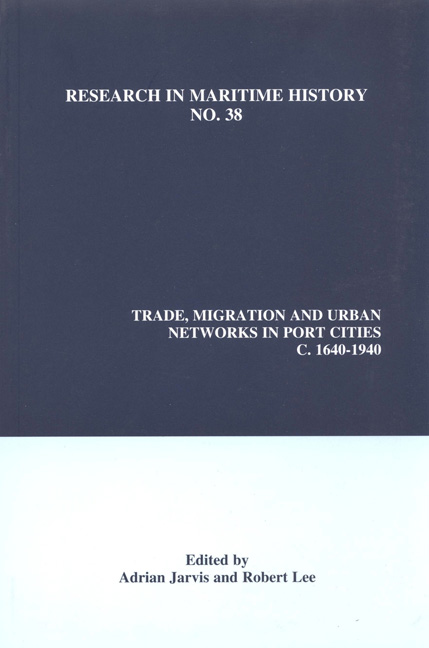Book contents
- Frontmatter
- Table of Contents
- Contributors' Notes
- “Trade, Migration and Urban Networks, c. 1640-1940: An Introduction”
- “Portuguese Jews in Amsterdam: An Insight on Entrepreneurial Behaviour in the Dutch Republic”
- “Contrasting Merchant Communities in the Early Eighteenth Century: Stockholm, Calabar and Charleston”
- “Integration of Immigrant Merchants in Trondheim in the Seventeenth and Eighteenth Centuries
- “In the Eye of the Storm: The Influence of Maritime and Trade Networks on the Development of Ostend and Vice Versa during the Eighteenth Century”
- “Exploiting International Webs of Relations: Immigrants and the Reopening of the Harbour of Antwerp on the Eve of the Nineteenth Century”
- “Migrants, Merchants and Philanthropists: Hierarchies in Nineteenth-Century Greek Ports”
- “Port Cities, Diaspora Communities and Emerging Nationalism in the Ottoman Empire: Balkan Merchants in Odessa and Their Network in the Early Nineteenth Century”
- “Combining Business and Pleasure? Cotton Brokers in the Liverpool Business Community in the Late Nineteenth Century”
“Combining Business and Pleasure? Cotton Brokers in the Liverpool Business Community in the Late Nineteenth Century”
- Frontmatter
- Table of Contents
- Contributors' Notes
- “Trade, Migration and Urban Networks, c. 1640-1940: An Introduction”
- “Portuguese Jews in Amsterdam: An Insight on Entrepreneurial Behaviour in the Dutch Republic”
- “Contrasting Merchant Communities in the Early Eighteenth Century: Stockholm, Calabar and Charleston”
- “Integration of Immigrant Merchants in Trondheim in the Seventeenth and Eighteenth Centuries
- “In the Eye of the Storm: The Influence of Maritime and Trade Networks on the Development of Ostend and Vice Versa during the Eighteenth Century”
- “Exploiting International Webs of Relations: Immigrants and the Reopening of the Harbour of Antwerp on the Eve of the Nineteenth Century”
- “Migrants, Merchants and Philanthropists: Hierarchies in Nineteenth-Century Greek Ports”
- “Port Cities, Diaspora Communities and Emerging Nationalism in the Ottoman Empire: Balkan Merchants in Odessa and Their Network in the Early Nineteenth Century”
- “Combining Business and Pleasure? Cotton Brokers in the Liverpool Business Community in the Late Nineteenth Century”
Summary
“A first-class merchant does not burden his life with a multitude of details, and is always seemingly in leisure, while intent upon great issues.“
Liverpool's established trans-Atlantic trading skills and its proximity to the Lancashire cotton manufacturing industry made it one of the most important ports in Europe by the late nineteenth century. By 1850 Liverpool handled eighty-five percent of Britain's cotton imports – the greatest trans-oceanic trade in the world at the time – and dominated its exports. By this period Liverpool had also become, and remains, the leader in the world cotton market. As the volume of trade increased, a group of specialist cotton brokers emerged. Since prices in the cotton trade were extremely volatile, many men preferred to spread their risks, which put the new specialist brokers in an important position as intermediaries. Previous historical research on this topic has concentrated mainly on the trade, with the result that relatively little is known about the cotton brokers as individuals. Speculation, the effects of events such as the American Civil War and the hazards inherent in the shipping of an easily damaged (and inflammable) cargo like cotton made it an extremely risky business. Extensive networks were required to keep a close eye on fluctuating prices. What demands did this trading environment make on the people involved with what was often a highly speculative trade?
This essay concentrates primarily on cotton brokers and their lives in a large port city. The core nominal data – basically, a list of people who called themselves cotton brokers – were derived from local trade directories (colloquially known as Gore's, after John Gore, who published them from 1766 onwards). This information was correlated with census material to reconstruct the Liverpool cotton broker community between 1850 and 1901. Almost 700 brokers and their firms and partnerships have been drawn from a much larger database. In addition, qualitative source material, such as obituaries, biographies and autobiographies, has been used to shed light on their lifestyles.
The second main aim of this study is to explore the attitudes of these men (and the occasional woman who infiltrated their ranks) to an underlying dichotomy: the relationship between work and leisure. Was trading a way of life, a vocation or simply a means to make a profit?
- Type
- Chapter
- Information
- Trade, Migration and Urban Networks in Port Cities, c. 1640–1940 , pp. 149 - 167Publisher: Liverpool University PressPrint publication year: 2008



